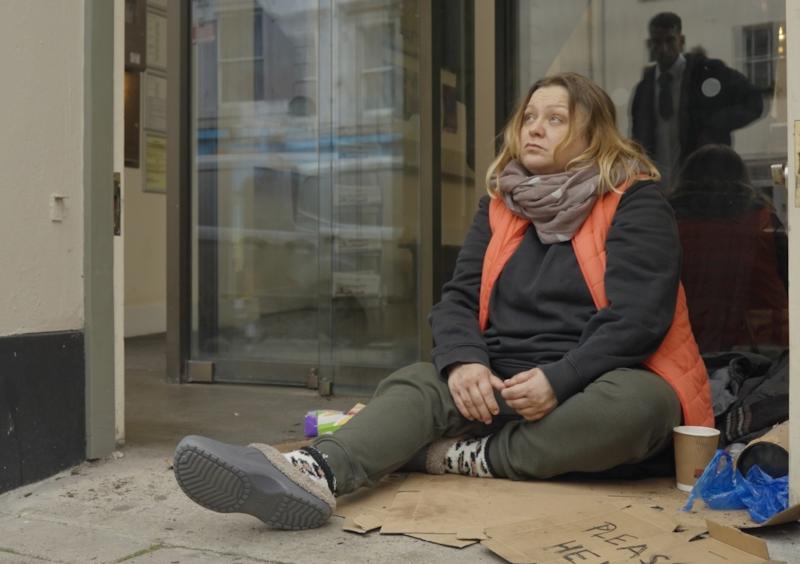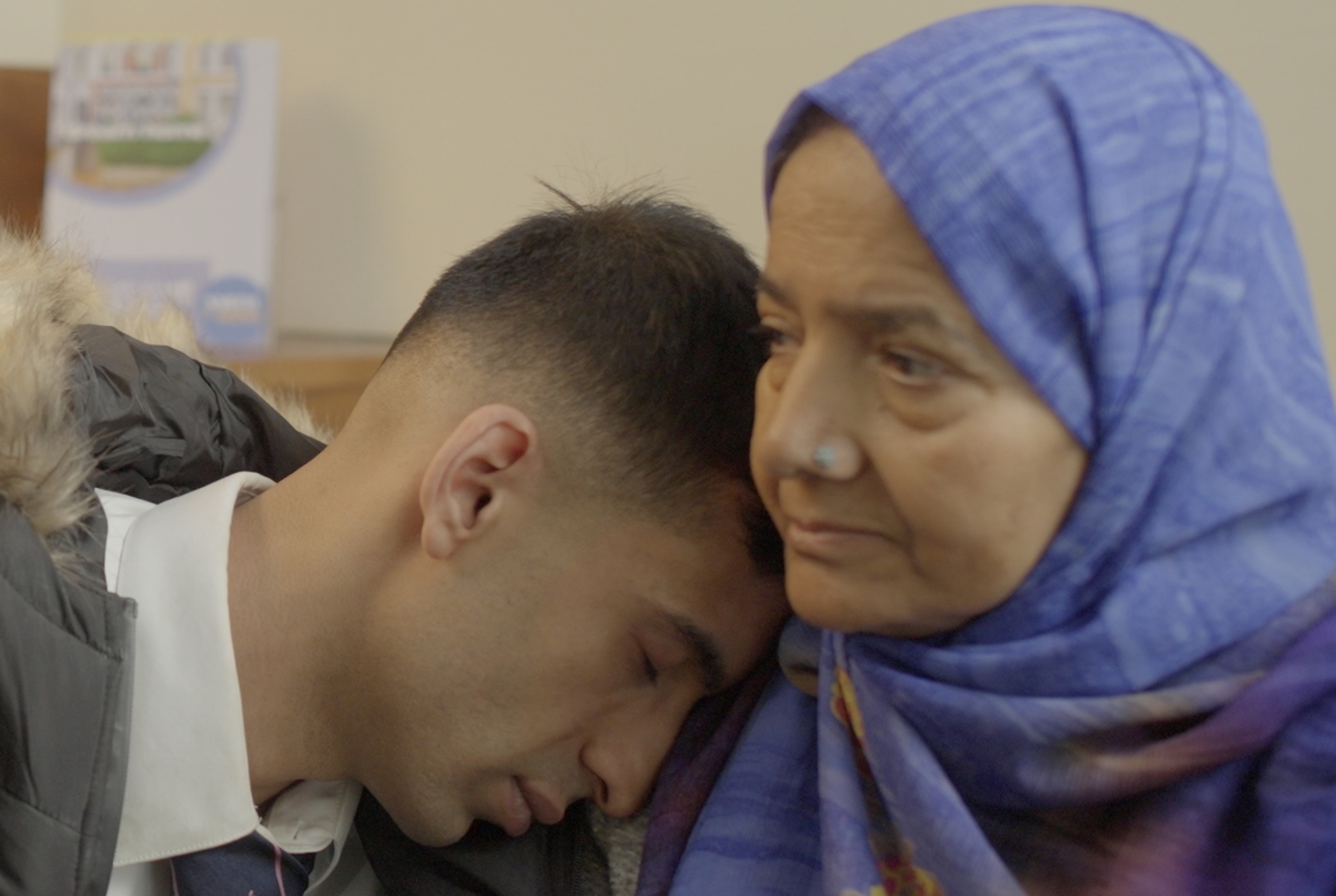More Than One Story review - nine helpings of provocative political theatre | reviews, news & interviews
More Than One Story review - nine helpings of provocative political theatre
More Than One Story review - nine helpings of provocative political theatre
Cardboard Citizens shine an unforgiving light on poverty in the UK

A stark end-title at the end of this collection of short films sums up the dire situation the UK is in: one in five people,14 million Britons, are now living in poverty.
This shocking statistic is one the enterprising people of the Cardboard Citizens company, with The Big Issue as producer-hosts, are shining an unforgiving light on. They have created an impressive collection of nine simply shot but effective monologues about homelessness, poverty and inequity that will appear weekly on bigissue.com. The sting in the tail here is that this is work created by writers, directors and actors with “lived experience” – of childhood poverty, racism, transphobia, government complacency, uncaring landlords or other factors boosting homelessness and poverty.
This is not cosy viewing, documenting the situation with tut-tutting and hand-wringing: it is an assault on such a stance. The first film, Sandwiches, spells out exactly why. A woman (played by Oriana White) in close up wolfs one down, then proceeds to launch into a diatribe about people who see a sandwich as something positive they can do for somebody sitting out in all weathers asking for help. But the sandwich, she argues, does nothing to put a roof over the recipient’s head.
Mostly five to six minutes long, these monologues continue to lob grenades into our sense of thinking we understand homelessness and how to fix it. With each monologue, a new aspect of the problem is aired. We don’t know how the young Asian teenager in “Sabbir at the Estate Agents” by Sonali Bhattacharyya (writer of Two Billion Beats) actually lives, the boy argues, crowded into a house where he sleeps on a sofa bed, with no lighting for night-time bathroom visits. On his way home in the rain from the abortive visit to the estate agents with his stressed mother (Noor Bshir, pictured below with Mansa Ahmed), who insists on walking to save the bus fare, he passes empty houses, all boarded up.
 We may think a young Indian woman in “The Surviving Room” represents one of the “lucky” ones with a roof over her head. Except it’s one she has to share with an unfeasible number of adults all fighting for space and unable to move on as rents soar around them. All are trapped in what she calls a “big TV show called Capitalism”, doomed to be “refugees in our own country”.
We may think a young Indian woman in “The Surviving Room” represents one of the “lucky” ones with a roof over her head. Except it’s one she has to share with an unfeasible number of adults all fighting for space and unable to move on as rents soar around them. All are trapped in what she calls a “big TV show called Capitalism”, doomed to be “refugees in our own country”.
The high-profile playwright Roy Williams challenges us even more aggressively In “Ozwald Boateng, If You Must”, via a fortysomething man with dreads (David Olapoju) who’s selling The Big Issue for the first time. He’s angry that he now wears the familiar red tabard, not his sharp Boateng suit – tabard/suit/tabard/suit, the quick editing presents us with him in both, and we can see how his image changes from needy Big Issue seller to stop-and-search bait, a well heeled Black man in a flash car, and back again. Crucially, he’s angry that he’s angry, as his fury at being persistently stopped by the police for driving while Black has led him to shout at them, then get fired, hospitalised and left homeless. Do we really think he deserves this, he demands?
Some of the scripts land their blows less directly, such as Bafta-winning Kayleigh Llewellyn’s “Boiling Frogs”, in which Natasha Sparkes appears as a likeable standup explaining the phenomenon of the frog that gradually succumbs to ever hotter water. Her bouncy stage shtick might not seem the prelude to an unhappy ending. But her sunniness disappears when she reveals her personal boiling water: being dragged back and forth from her home by her mother as an escape from domestic violence. Or there’s the fresh-faced teenager describing a blissful kiss at a bus stop whose lack of a home will put the brakes on any further relationship between the pair. Here, we discover, homelessness has been caused by the teenager’s refusal to tick the gender box on the housing forms marked “cis”.
 Possibly the most polished of the playlets is Errol McGlashan’s “No Walls, Still Trapped”, featuring Ezra (Michael Quartey, pictured left), whom we see on the stairs of a white-painted institutional building that turns out to be a prison. Ezra has gained a 2:1 in criminology there. But he’s not the only one whose talent has been squandered: as the father-figure the younger inmates need, he is mentoring Terry, a neurodiverse lad who was in care, became homeless and turned to crime. But Terry, Ezra points out, had a brilliant business idea that would have changed his life had he had the support and funding to make it fly.
Possibly the most polished of the playlets is Errol McGlashan’s “No Walls, Still Trapped”, featuring Ezra (Michael Quartey, pictured left), whom we see on the stairs of a white-painted institutional building that turns out to be a prison. Ezra has gained a 2:1 in criminology there. But he’s not the only one whose talent has been squandered: as the father-figure the younger inmates need, he is mentoring Terry, a neurodiverse lad who was in care, became homeless and turned to crime. But Terry, Ezra points out, had a brilliant business idea that would have changed his life had he had the support and funding to make it fly.
The most scathing, and funniest, item is Debbie Hannan’s “Snakes and Landlords”, which skewers the middle-class ladies in a focus group about homelessness that an impoverished woman (Yvonne Wickham) has joined for the Amazon vouchers given out at the end. Among the other women she finds a few sympathetic souls, but there are also the “wincey-pincey” ladies who deem themselves above the left-behinds. One hilariously suggests a gentler, less triggering word for “homeless” needs to be found: Wickham suggests “f***ing solvable”.
Ramming the project’s message home in a rousing finale is “This Is What It Means” by the Cardboard Citizens’ director, Chris Sonnex, in which Shahab Awad, fronting the Community Company, sardonically warns the complacent that they would do better to stay silent if they have nothing constructive to say.
This take-no-hostages project won’t please people who feel unfairly judged by it, and some of the items do make you want more specifics on the problem. But that, presumably, is exactly what Cardboard Citizens are hoping for: greater awareness and engagement, less complacency. It’s smart, provocative political theatre.
The future of Arts Journalism
You can stop theartsdesk.com closing!
We urgently need financing to survive. Our fundraising drive has thus far raised £49,000 but we need to reach £100,000 or we will be forced to close. Please contribute here: https://gofund.me/c3f6033d
And if you can forward this information to anyone who might assist, we’d be grateful.

Subscribe to theartsdesk.com
Thank you for continuing to read our work on theartsdesk.com. For unlimited access to every article in its entirety, including our archive of more than 15,000 pieces, we're asking for £5 per month or £40 per year. We feel it's a very good deal, and hope you do too.
To take a subscription now simply click here.
And if you're looking for that extra gift for a friend or family member, why not treat them to a theartsdesk.com gift subscription?

Add comment